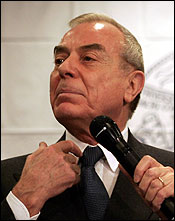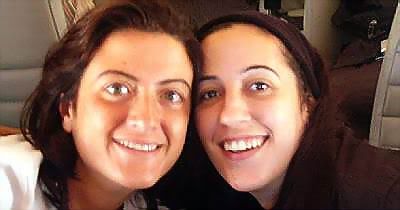

|
Your Most Trusted Source of Foreign
News and Views About the United States
|
By Andrea Garibaldi
August 27, 2005
ROME: Maurizio Scelli
[acting commissioner of the Italian Red Cross] described how Iraqi terrorists
were given medical treatment in exchange for freeing Italian captives Simona Pari and Simona Torretta. He also claimed
that [Undersecretary to the
Prime Minister] Gianni Letta had
agreed that the


The Prime Minister’s Office was keen to distance itself. “These recollections fall within the scope of the national and international autonomy of the Red Cross.” And as Mr. Scelli points out, “It was our operation. I only notified the authorities unofficially.”
Magistrates in Rome investigating the abduction now want to question
Scelli again. COPACO [the Committee of Secret Services Control], the Parliament’s security service watchdog, will also interview him
over the next few days. Opposition MPs have asked the government to report
to Parliament, while members of the majority accuse Mr. Scelli
of seeking the limelight. The ruling majority was nominated as acting Red
Cross commissioner in April 2003, but for months he has been straying off-message.
Elections for a new Italian Red Cross president will be held in December,
when Scelli will have to look for a new job.
STORM
The storm erupted in yesterday’s
La Stampa newspaper, when Mr. Scelli gave journalist Guido Ruotolo
new details about his activities in

The reaction from the Prime Minister’s Office arrived before lunchtime. A statement pointed out that the Red Cross is an independent organization that is neither controlled nor directed by the Italian authorities, and that the government has never “influenced or controlled the commissioner’s activities.”
Referring to the
In an RAI television broadcast, Scelli claimed that the release of the two Simonas was “an operation we [the Red Cross] claimed as our own. We managed the negotiations the Iraqis, including the mediators and all of those who acted, laying down specific conditions about which I notified the authorities only informally, to enable the episode to be concluded in the way we know it was.”
There is no clear explanation
of the most controversial phrase, according to which Mr Scelli’s fellow Abruzzan [inhabitant of Abruzzo]
and sponsor Gianni Letta endorsed the decision not
to tell the Americans. In Washington yesterday, a State Department spokesperson
said that the entire issue was a matter for the Italian Government.
MAGISTRATES
Doubts remain over what it was that prompted Mr. Scelli to reopen the hostage issue. He said nothing to magistrates about treating terrorists after the the two Simonas were released, but restricted himself to references to the treatment of Iraqi children suffering from leukaemia. But in “Storia d’Italia da Mussolini a Berlusconi” (The History of Italy from Mussolini to Berlusconi), Mr. Scelli may have dropped a hint when he told author Bruno Vespa that during the negotiations, an intermediary said, “We need medicines and treatment for two people whose lives are at risk.”
Massimo Brutti, of the Democrats of the Left Party (DS) and a member
of COPACO, says that he detects in Scelli’s words
what appears to be an “attempt to protect his back.” For Gigi Malabarba, of the Communist Refoundation Party
and another member of COPACO, Scelli
has merely stated, “what everyone knows: that the
Opposition parliamentarians, including Minniti (DS), Pecoraro (Green) and Lusetti (Daisy Alliance), asked the government to report to Parliament. It fell to Minister Carlo Giovanardi [Minister for Relations with Paliament] to make the denial. “It’s all been cleared up” he said.
However, the irritation
of ruling Parliamentarians was obvious. Deputy Foreign Minister Alfredo Mantica
(National Alliance) pointed out that, “with Scelli,
there have been problems of limelight-seeking in the past,” and Forza
Italia’s Alfredo Biondi, deputy speaker of the lower
house, maintains that “the breach of confidentiality that has occurred for
vanity or whatever other reprehensible reason is very serious.”